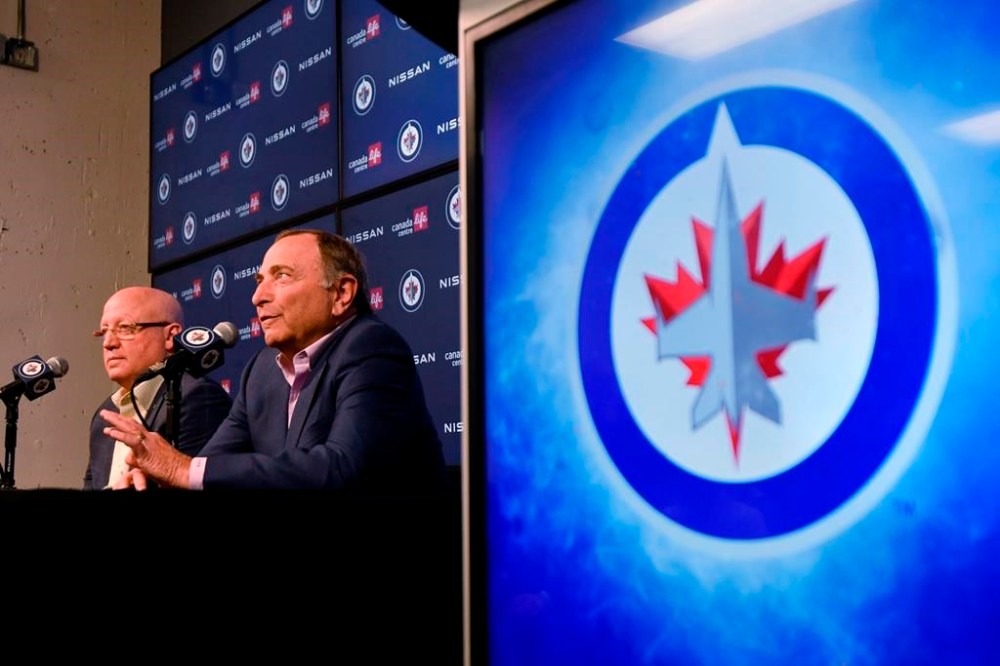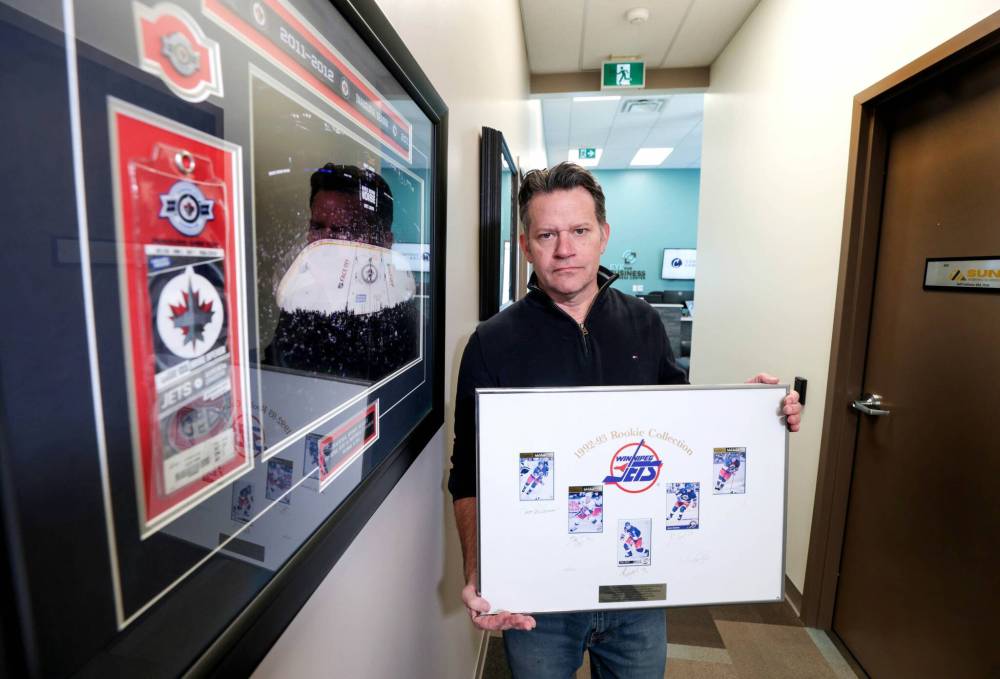Don’t take us for granted Jets’ devotees say team brass badly fanned with its clumsy messaging, and should remember stalwart support isn’t a one-way street
Read this article for free:
or
Already have an account? Log in here »
To continue reading, please subscribe:
Monthly Digital Subscription
$1 per week for 24 weeks*
- Enjoy unlimited reading on winnipegfreepress.com
- Read the E-Edition, our digital replica newspaper
- Access News Break, our award-winning app
- Play interactive puzzles
*Billed as $4.00 plus GST every four weeks. After 24 weeks, price increases to the regular rate of $19.95 plus GST every four weeks. Offer available to new and qualified returning subscribers only. Cancel any time.
Monthly Digital Subscription
$4.99/week*
- Enjoy unlimited reading on winnipegfreepress.com
- Read the E-Edition, our digital replica newspaper
- Access News Break, our award-winning app
- Play interactive puzzles
*Billed as $19.95 plus GST every four weeks. Cancel any time.
To continue reading, please subscribe:
Add Free Press access to your Brandon Sun subscription for only an additional
$1 for the first 4 weeks*
*Your next subscription payment will increase by $1.00 and you will be charged $16.99 plus GST for four weeks. After four weeks, your payment will increase to $23.99 plus GST every four weeks.
Read unlimited articles for free today:
or
Already have an account? Log in here »
Hey there, time traveller!
This article was published 29/02/2024 (730 days ago), so information in it may no longer be current.
Plummeting season-ticket sales and lacklustre attendance have marred what has so-far been a spectacular season for the Winnipeg Jets hockey club — spurring public speculation and skepticism surrounding the team’s prospective future.
Tuesday’s visit from National Hockey League commissioner Gary Bettman, and recent messaging from team co-owner Mark Chipman, helped to quell the fear rising in a fan-base that knows what it’s like to lose their home team.
Still, the economic stability of the hockey club leaves much to be desired. Comments by Chipman to the Athletic, musing that “it’s not going to work over the long haul,” helped fuel the sense of panic.

A formerly robust raft of season-ticket holders, once numbering more than 13,000, has dropped to roughly 9,500 in recent years. Worse, only around 1,425 of those remaining tickets belong to corporate owners — something both men agree is crucial to the team’s long-term viability.
Chipman and Bettman each held media appearances in Winnipeg this week, reassuring fans the teams is under no threat of relocation while simultaneously pleading for businesses and fans to consider purchasing season tickets.
The ask came with an acknowledgement from Chipman that his organization, True North Sports and Entertainment, has mishandled its approach to recruiting, retaining and serving its corporate and individual customers
The Free Press spoke with an assortment of current, former and prospective season-ticket holders to hear their say on where the organization has fallen short, and what the future potentially holds.
Some of the participants hold seats under their own names, while others are members of a consortium of fans who purchase tickets as a group.
Jeff Eyamie, 50, a current season-ticket holder who has purchased tickets as part of a group for the past five seasons.
In the early days after the Jets’ 2011 return to Winnipeg, Eyamie found himself on the outside looking in — one of an estimated 8,000 prospective season-ticket holders relegated to a waitlist while demand was at an all-time high.
“Eventually, I was able to get into a season-ticket group, mostly because the demand was going down,” he said. “The Jets were just starting to become a playoff team, so that was very exciting… It was a great feeling.”
That excitement has waned in recent years, despite the team’s performance this season (37-15-5), due to a “feeling of alienation” among fans, he said.
With a capacity of 15,225, the Jets’ home rink enjoyed nightly sellouts for the much of the first decade after the team’s return. Average attendance plummeted to under 13,000 during the 2021-22 season, owing largely to provincial restrictions imposed during the COVID-19 pandemic.
“Once the bottom fell out with ticket demand and you were able to get à-la-carte tickets for virtually any game, suddenly the season-tickets became less desirable.”–Jeff Eyamie
Those numbers have remained well below capacity in the seasons since.
Meanwhile, the cost of ticket packages has risen nearly every year, with the price tags for the upcoming 2024-25 season — announced by True North this week — ranging from $1,730 to $8,867 per seat for 44 games. Tickets for a quarter season (11 games) are as low as $506.
On average, the prices are the second-lowest in Canada and reflect a weighted 0.5 per cent reduction from the previous season.
Still, the lack of demand has resulted in a loss of value for season-ticket holders, Eyamie said.
“Once the bottom fell out with ticket demand and you were able to get à-la-carte tickets for virtually any game, suddenly the season-tickets became less desirable,” he said. “Now, you can just choose your own games you want to attend and possibly even pay less than face value if you’re patient enough.”
Eyamie said he would like to see the organization prioritize more game-day events, such as pre-game gatherings at True North Square downtown.
He contrasted the Jets’ game-day culture to that of the Winnipeg Blue Bombers — which is known to feature tailgate parties before games.
“Something the Blue Bombers have done extremely well is create an affordable product that becomes an all-day event… that’s an issue True North needs to address, at least once in a while,” he said.
Derek Rolstone, 50s, who does not own season tickets but frequently attends games.
Rolstone started going to Jets games in 1976, after the former iteration of the Winnipeg Jets defeated the Edmonton Oilers to win the Avco World Trophy, becoming playoff champions in the now defunct World Hockey Association.
His family held season tickets throughout his childhood, with Rolstone estimating he has attended up to 500 games in his lifetime. He has not been a season-ticket holder at any point since the team returned to Winnipeg, but said he would consider purchasing tickets in the future.
“I’ve loved this team for a long time, and I just don’t feel like they love me back,” he said. “They haven’t shown their love for the fans; they’ve taken them for granted. I think they are starting to realize it with the comments and the feedback they are getting, but they should’ve understood this years ago.”
Rolstone, who owns a human resources consulting firm, said the roughly 27 per cent drop in season-ticket holders rightfully set off alarm bells for True North and it is now up to them to win back support.
“Nobody feels sorry” for a professional hockey club that has increased its value from an estimated US$170 million to US$780 million, he said.
RUTH BONNEVILLE / FREE PRESS Jets fan Derek Rolstone at his office with Jets memorabilia.
He suggested the organization double-down on efforts to reconnect with former season-ticket holders, surveying them on why they decided to leave and what True North can do to get them back.
Chipman has committed to doing just that, telling The Athletic last week he was making personal calls to former stalwart fans to win them back.
“They were farmers, and now they need to be hunters,” Rolstone said, using the analogy to describe how the once ripe crop of waitlisted season-ticket holders has since wilted to nothing, putting True North in a position in which it must now “hunt” to replenish stock.
Rolstone said he is cautiously optimistic the Jets ownership has recognized the issue and is making efforts to reconcile with fans, but “it’s too early to tell.”
Michael Kofler, 54, who has held season-tickets since 2011.
A former Manitoba Moose season-ticket holder, Kofler was among the fans who had first dibs on season-tickets when the Jets returned to Winnipeg. He purchased 16 seats under his name during the inaugural return season, selling select games to friends and family.
“I wasn’t in it to make money, but wanted to help friends, family, co-workers and other people get tickets to games,” he said. “Up until COVID, I still had seven tickets in my name. Then, the desire… basically dried up.”
He disputed many complaints levied by others in the Jets community, including that arena concession prices are too high, parking is too limited or expensive, and customer service is lacking — saying he believes True North is comparable to organizations in other hockey markets.
Overall, his experience as a season-ticket holder has been positive, although he would like to see better communication between customers and ticket reps, he said.
Kofler was not swayed by public speculation True North was threatening to pull out of Winnipeg, saying the organization has invested too much in the city.
To date, True North has spent hundreds of millions developing infrastructure in an effort to revitalize downtown Winnipeg.
“I think the media actually ran with it a little, saying ‘Oh, if we don’t get up to 13,000 (season-ticket holders) then we’re going to lose the Jets,’” he said.
“Hopefully we keep on winning. Hopefully we go three or four rounds in the playoffs again. This city will go nuts.”
Gerald Peterson, 69, who is a current season-ticket holder with the Jets and the Manitoba Moose.
Peterson, who also held season tickets with the previous iteration of the Jets before it departed in 1996, said he was frustrated by the initial messaging from True North — including the Forever Winnipeg video campaign released last April.
The video sparked controversy among the fan base, with some perceiving it as a veiled threat to relocate the team. The video has since been removed online.
At the time, Peterson felt True North was laying blame on its customers rather than accepting it had failed to retain and reinforce its base of season-ticket holders.
“You don’t blame your customer. Period,” said Peterson, who spent his career working as an accountant and business consultant. “They seem to be finally admitting that maybe this is not our fault, maybe this is their fault.”
He calls on True North to focus on community engagement and fan experiences, saying Jets faithful understand the challenging economics and are willing to shell out their dollars in exchange for a relationship with the team.
The winds of change are blowing in Winnipeg, and he is optimistic about the team’s future, he said.
“Fans took True North to task and cancelled a whole bunch of season tickets… that time has passed now. We have to get positive and we have to work together. We have to hold management accountable, but we can’t desert them,” Peterson said.

Sean Petty, 40s, a season-ticket owner since 2011.
Petty and five friends became season-ticket holders as a group when the Jets returned to Winnipeg. However, economic factors brought on by the pandemic forced some members to drop out. Now, he shares a quarter season-ticket package with just three people.
“Life happens. Things change. Mark Chipman talked about that, and that’s exactly what happened to us,” Petty said, referencing comments from Chipman in which he predicted economic factors were causing season-ticket groups to break up. “That’s why corporations are more stable in the long term.”
Petty said he realized attendance may be in dire straights last year, when he began seeing swaths of empty seats in the stands.
“As somebody that experienced the team leaving the first time, that left me quite concerned about the team’s future,” he said. “I’m a lot more optimistic now. I think True North is doing the things it needs to do to bring fans back, and I believe they will.”
Petty shared a story about being invited to attend a Winnipeg Jets practice with media members during the Jets’ first season back in Winnipeg, saying it deepened his connection to the team.

In recent weeks, he received a care package from the True North team, complete with a letter of appreciation signed by Chipman.
“That kind of stuff sticks with you,” Petty said. “They are reaching out and thanking us, and that’s something I don’t recall happening before.
Petty credited the team for other initiatives, including enlisting Jets team members to coach young players at Camp Manitou.
“They are moving in the right direction,” he said. “The Jets get it.”
tyler.searle@freepress.mb.ca

Tyler Searle is a multimedia producer who writes for the Free Press’s city desk. A graduate of Red River College Polytechnic’s creative communications program, he wrote for the Stonewall Teulon Tribune, Selkirk Record and Express Weekly News before joining the paper in 2022. Read more about Tyler.
Every piece of reporting Tyler produces is reviewed by an editing team before it is posted online or published in print — part of the Free Press‘s tradition, since 1872, of producing reliable independent journalism. Read more about Free Press’s history and mandate, and learn how our newsroom operates.
Our newsroom depends on a growing audience of readers to power our journalism. If you are not a paid reader, please consider becoming a subscriber.
Our newsroom depends on its audience of readers to power our journalism. Thank you for your support.
History
Updated on Thursday, February 29, 2024 7:49 PM CST: Adds Chipman quote to lead
Updated on Friday, March 1, 2024 8:43 AM CST: Fixes paragraph spacing










